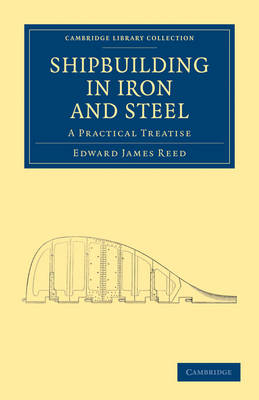
Shipbuilding in Iron and Steel
A Practical Treatise
Seiten
2011
Cambridge University Press (Verlag)
978-1-108-02645-1 (ISBN)
Cambridge University Press (Verlag)
978-1-108-02645-1 (ISBN)
Sir Edward James Reed (1830–1906) was a pioneering naval architect, who advocated the use of scientific calculations in preparing his innovative designs for ironclad ships. This textbook, first published in 1869, describes the design and construction of the iron warships which were replacing traditional wooden vessels during this period.
Sir Edward James Reed (1830–1906) was an innovative naval architect who, after attending the Central School of Mathematics and Naval Architecture in Portsmouth, was appointed chief constructor of the Navy in 1863. This was a crucial time for the navy, as traditional wooden sailing ships began to be armoured or rebuilt in iron in response to more powerful weaponry. Reed pioneered the methodical use of scientific calculations to determine a ship's weight, strength and stability, and was responsible for a number of revolutionary designs. He later founded his own consultancy and designed ships for other countries including Germany, Chile and Brazil. This textbook, first published in 1869, contains a comprehensive overview of the design and construction of the various classes of iron ships of the time, and the new features they incorporated. It also includes descriptions of procedures in Royal Dockyards and various civilian shipyards.
Sir Edward James Reed (1830–1906) was an innovative naval architect who, after attending the Central School of Mathematics and Naval Architecture in Portsmouth, was appointed chief constructor of the Navy in 1863. This was a crucial time for the navy, as traditional wooden sailing ships began to be armoured or rebuilt in iron in response to more powerful weaponry. Reed pioneered the methodical use of scientific calculations to determine a ship's weight, strength and stability, and was responsible for a number of revolutionary designs. He later founded his own consultancy and designed ships for other countries including Germany, Chile and Brazil. This textbook, first published in 1869, contains a comprehensive overview of the design and construction of the various classes of iron ships of the time, and the new features they incorporated. It also includes descriptions of procedures in Royal Dockyards and various civilian shipyards.
Preface; 1. Practical considerations on the strength of iron ships; 2. Keels, keelsons, and garboard-strakes; 3. Stems; 4. Stern posts; 5. Transverse and longitudinal systems of framing; 6. Combined transverse and longitudinal system of framing - framing of 'Warrior', 'Northumberland', &c.; 7. Bracket-plate system of framing - framing of 'Bellerophon', 'Hercules', &c.; 8. Deck framing and pillaring; 9. Deck stringers and plating; 10. Outside plating; 11. Bulkheads; 12. Topsides; 13. Rudders; 14. Iron masts; 15. Miscellaneous details; 16. Steel plates for shipbuilding; 17. Rivets and rivet-work; 18. On testing iron and steel; 19. Lloyd's and the Liverpool rules for iron shipbuilding; 20. Systems of work; 21. Armour plating; Appendix; Index.
| Erscheint lt. Verlag | 17.2.2011 |
|---|---|
| Reihe/Serie | Cambridge Library Collection - Technology |
| Zusatzinfo | 1 Tables, black and white; 5 Plates, black and white; 266 Halftones, black and white |
| Verlagsort | Cambridge |
| Sprache | englisch |
| Maße | 140 x 216 mm |
| Gewicht | 740 g |
| Themenwelt | Geschichte ► Teilgebiete der Geschichte ► Militärgeschichte |
| Geschichte ► Teilgebiete der Geschichte ► Technikgeschichte | |
| Technik ► Fahrzeugbau / Schiffbau | |
| ISBN-10 | 1-108-02645-1 / 1108026451 |
| ISBN-13 | 978-1-108-02645-1 / 9781108026451 |
| Zustand | Neuware |
| Haben Sie eine Frage zum Produkt? |
Mehr entdecken
aus dem Bereich
aus dem Bereich
neueste Manipulationstechniken als Waffengattung der NATO
Buch | Softcover (2023)
Westend (Verlag)
CHF 33,55
Deutschlands Schwäche in der Zeitenwende
Buch | Softcover (2023)
C.H.Beck (Verlag)
CHF 25,20


